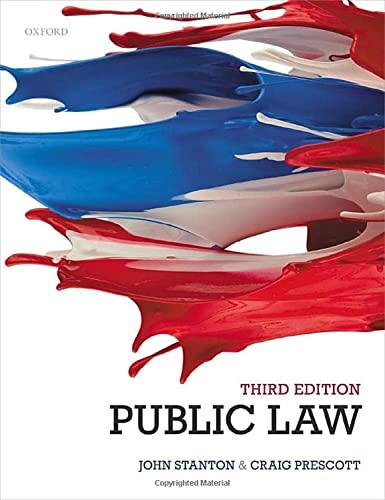Question
Chapter 34 - 35 21. Describe product liability and the tort upon which it is based. 22. Identify the kinds of business that can be
Chapter 34 - 35
21. Describe product liability and the tort upon which it is based.
22. Identify the kinds of business that can be charged with product liability.
23. Explain the legal reasoning behind the concept of strict liability and weigh its consequences for businesspeople and consumers.
24. Summarize the testing procedure required by the Food and Drug Administration in order to gain approval to sell a drug.
25. Identify examples of consumer products regulated by the Consumer Product Safety Commission.
26. Explain some provisions of the Master Settlement Agreement.
27. Failure to Warn Is it obvious to the reasonable consumer that disposable containers containing coffee and other beverages are hot? Should retailers be required to warn customers to exercise care in handling these containers?
28. Who Can Be Held Liable Where should the responsibility lie for product safety:
manufacturers, retailers, users, or government regulators?
29. Strict Liability Why would a company that is subject to strict liability be hesitant to introduce new or innovative products?
30. Drugs Should the federal and state governments allow consumers to purchase drugs from Canada and other countries on the Internet?
31. Tobacco Because tobacco is known to cause health problems, should it be illegal to use?
32. A Question of Ethics Is it ethical for a pharmaceutical company to charge high prices for prescription drugs when these drugs are needed by persons who cannot afford them and whose lives depend upon them?
Chapter 35
21. Discuss why the malpractice of professionals is considered more serious by society than negligence by nonprofessionals.
22. Of the four elements of negligence, is one of them more critical than the others?
23. Explain how the malpractice or negligence of a professional might cause injury to third parties.
24. Identify a financial loss suffered by a third party for which an accountant can be found liable.
25. Distinguish between insurance agents and brokers. Do you think that one should bear greater responsibility than the other for advising buyers about their insurance needs?
26. What are some ways that professionals can reduce their risk of negligence lawsuits?
27. Licensing of Professionals Does the licensing of professionals guard against negligence? Advance arguments for and against.
28. Malpractice Insurance Does having malpractice insurance lessen the care taken by professionals?
29. Malpractice Insurance Because most professionals carry liability insurance, what is the role of the insurance industry in promoting the competence of professionals?
30. Churning Where should the line be drawn between a reasonable number of securities transactions and churning?
31. A Question of Ethics The purchase of life insurance often involves the client choosing between whole life insurance, which includes a savings feature, and term insurance, which provides only protection. The sales commission also varies depending on the type of policy. Is it ethical for an insurance company to base the agent's commission on the type of policy sold, regardless of the buyer's needs?
Step by Step Solution
There are 3 Steps involved in it
Step: 1

Get Instant Access to Expert-Tailored Solutions
See step-by-step solutions with expert insights and AI powered tools for academic success
Step: 2

Step: 3

Ace Your Homework with AI
Get the answers you need in no time with our AI-driven, step-by-step assistance
Get Started


